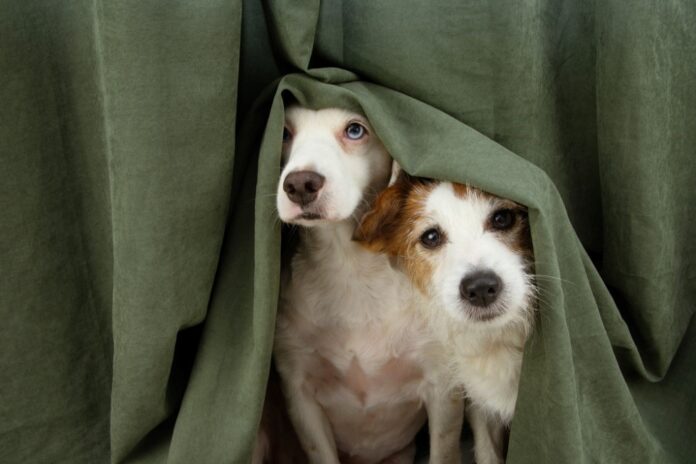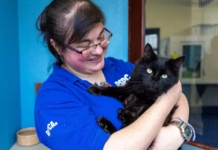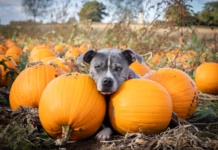Snapping spaghetti and hidden beds:
5 tricks to keep pets stress-free during firework season
Almost half (45%) of dogs in the UK are scared of fireworks. For those with pets, Bonfire Night on 5th November is not always something to be celebrated. Firework season can be filled with anxiety as people struggle to keep their beloved pets feeling safe and secure.
Pets can develop a negative association with loud noises at any time, so it’s important to be aware of the signs. If your pet is acting unusual, being disruptive, hiding, excessively licking their lips or pacing, this could signify they’re feeling stressed about Bonfire Night.
Angela Laws, award-winning community manager of TrustedHousesitters, is also a pet sitter with 14 years of experience – and she’s here to help this firework season. She’s sharing the best advice she’s learnt over the years to reduce stress in pets. In extreme anxiety cases, always consult your veterinarian.
You can help keep your furry friends feeling safe and sound during firework season with these five top tips.
1. Use household products to desensitise your pets to loud noises
One way to ensure your pets are stress-free on Bonfire Night is to begin desensitising them to loud noises from a young age. The earlier you start, the better – however, you can start this process at any point and still get good results.
You can start small – look for items you have around the house to stimulate the sudden pop of fireworks. Snapping spaghetti is a good place to start if your pet is extremely anxious. You can then build up to louder noises, such as popping bubble wrap. Ideally, you should get to a point where you can play audio of fireworks in the week before Bonfire Night, to get them used to the sounds. However, if your pet is getting scared of the noises, it’s best to stop straight away. Positive reinforcement is key here, so make sure you’re rewarding your pet with pats and treats after each loud noise. Soon, they’ll stop associating sudden noises with fear (and probably start sniffing around you for treats instead!).
2. Create a safe space
For cats or dogs, you should create a safe space they can get to at all times if they feel anxious. Crate training can be useful – many dogs enjoy crates as the space becomes their own safe haven, especially if covered by a blanket to make it feel even more private. If you don’t have a crate, place their bed or basket in a quiet, calm area, such as an alcove or corner, underneath a table, or even in a cupboard; anywhere they can get to quickly, knowing they won’t be disturbed.
3. Create a relaxing ambience
Your pets’ surroundings can make a huge difference when it comes to their overall mood on Bonfire Night. You should close all your curtains or blinds as early as possible. This will hide the flashing lights that your pet may associate with fear, as well as help muffle any noises from outside.
An easy trick is to attempt to drown out any firework noises by playing your TV or a music device at a semi-loud level. Many radio channels play music specifically designed to calm pets during firework season, and there are also specially curated playlists available.
4. Consider swaddling
If your dog is experiencing firework anxiety, swaddling can help. Like swaddling a baby, this technique involves gently applying pressure to your pet’s body through a vest or wrap and can help promote calmness. You can buy specialist full-body options (such as The Thunder shirt) or weighted vests which act as a calming jacket for dogs.
If you don’t have a swaddle already bought, you can make a DIY swaddle with a tea towel, scarf, or other fabric secured with an elastic band or hair tie. Make sure there’s only a little pressure, and you’re not tightly fastening anything close to your pet’s neck, as this could be dangerous. If you make a DIY swaddle, always monitor your pet to make sure they’re safe. If they seem uncomfortable at any point, remove it straight away.

Image credit: Shutterstock.
5. Lead by example
One of the worst things you can do around a frightened pet is show them you are also scared. It can be distressing seeing a beloved pet going through a tough time but try not to let any of your own stress or sadness show – it will reinforce the idea that there is something to be afraid of. Dogs are extremely sensitive, so will pick up on your emotions. Keep calm, upbeat, and happy to help reassure your furry friend there’s nothing to worry about.
For more top tips for pet owners and animal lovers, visit the Trusted Housesitters Blog.

| [donate]
| Help keep news FREE for our readersSupporting your local community newspaper/online news outlet is crucial now more than ever. If you believe in independent journalism,then consider making a valuable contribution by making a one-time or monthly donation. We operate in rural areas where providing unbiased news can be challenging. |



















